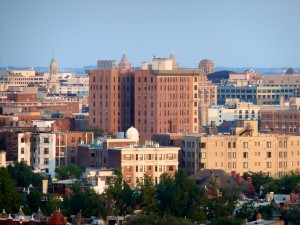A DC Council committee voted this week to bolster a novel tool to get more affordable housing throughout the city. The bill would require developers to include affordable housing any time they buy land from the city for residential development. We urge the full Council to pass the legislation when it meets on Monday.
The Disposition of District Land for Affordable Housing Act of 2013, considered by the Committee on Economic Development, would allow DC land to be sold below market value to subsidize the costs of the affordable housing. This is a smart approach because it would use land value — rather than needing to use tax dollars — and because it would create mixed-income communities throughout DC.

- How much affordable housing? 30 percent of the new housing would need to be affordable if it is built within a one-half mile of a metro stop, or one-quarter of a mile from a bus priority corridor or streetcar line. In other areas, 20 percent of the units would need to be affordable.
- Affordable for whom? In housing built as rental, one-fourth of the low-cost units would be for residents making 30 percent or less of area median income (AMI) or $29,000 for a family of three. The rest of the affordable units would be for residents making 50 percent of AMI, or $48,300 for a family of three.
In homeownership buildings, half of the affordable units would be for residents earning 50 percent of AMI and the other half would be for those earning 80 percent of AMI or $78,200 for a family of three.
A recent disposal of land at 5th and I Streets NW, in the bustling Mt. Vernon neighborhood, highlights why this bill is so critical. When DC put the property on the market, the land was valued at over $19 million’enough to create a substantial number of affordable housing units. The District did not require bidders to commit to affordable housing.
So it is not surprising that two of four qualifying bids offered no affordable housing beyond requirements that apply to housing built on private land (called Inclusionary Zoning). Another offered to make a modest $1 million contribution to the Housing Production Trust Fund which would build about 13 affordable units. The last developer, the one selected by the city, offered to build 100 affordable units but not in Mt. Vernon Square where residents could enjoy the development occurring there. The low-cost units could end up anywhere, such as in a neighborhood that is far from services, good schools, and job opportunities.
That is why it make sense to set clear rules to ensure that all public land sales deliver a significant share of affordable housing. That is exactly what this bill would do and why the DC Council should vote yes on this bill Monday.
To print a copy of today’s blog: click here.
